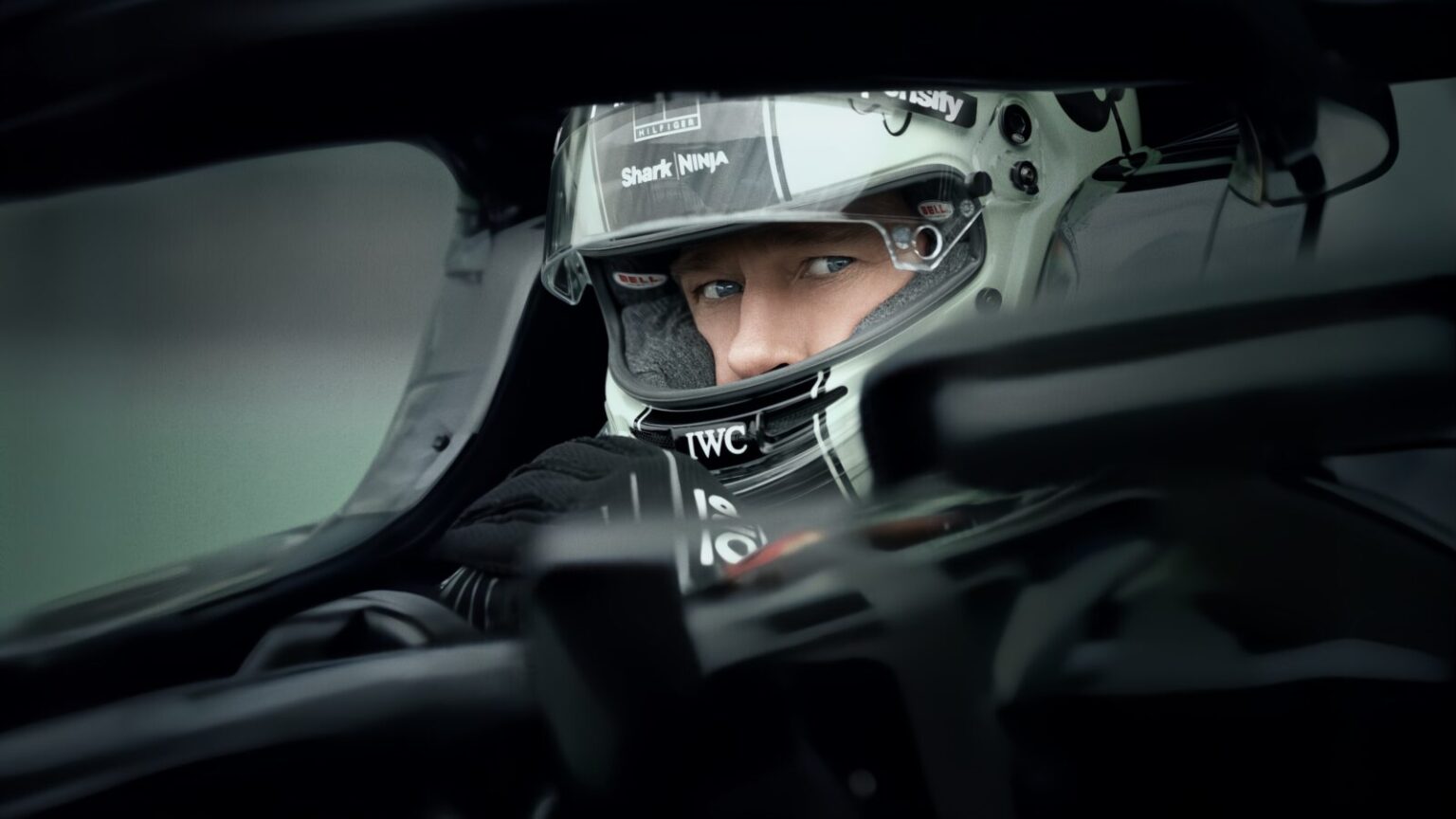TL;DR: It might be a high-gloss brand showcase dressed up in IMAX polish, but F1: The Movie throws so much heart, horsepower, and high-stakes drama at you that it burns through its corporate shell and ignites a genuinely thrilling ride. Pitt’s return-to-form performance as a cranky old driver meets Kosinski’s eye-melting race sequences—and the result is a pulse-pounder that doesn’t just show speed, it makes you feel it.
F1 The Movie
The Corporate Fuel That Powers Real Emotion
Let’s start with the obvious: this movie is practically dripping in logos. If you took a shot every time you spotted a brand during F1: The Movie, you’d wake up in a hospital with Lewis Hamilton holding your hand and whispering, “You went too hard.” And yet… somehow it doesn’t matter. Actually, scratch that—it adds to the experience. Because Formula One isn’t just a sport. It’s a spectacle. A gleaming, jet-set, sponsor-laden ballet of danger and drama.
Director Joseph Kosinski (Top Gun: Maverick) knows exactly what he’s doing. You don’t make a movie about Formula One to pretend it’s some salt-of-the-earth pastime. This isn’t baseball in a cornfield. It’s ultra-billion-dollar machinery chasing milliseconds. It’s egos and engineers, speed and strategy, politics and pit stops. And this movie gets that.
From the very first sequence, Kosinski sets his tone: wide aerial shots that cradle racetracks like precious circuits in a motherboard, intimate cockpit cameras that shake like GoPros strapped to a jet engine, and a soundscape so visceral you feel it in your ribcage. The film doesn’t apologize for being big. It dares you to keep up.
Sonny Hayes: The Ghost in the Machine
Enter Brad Pitt, whose Sonny Hayes is a delicious contradiction: cocky yet broken, charming yet aloof, legendary yet totally washed. Once a star in the ‘90s, Sonny now drifts through the motorsport underground like a ghost with a hangover. He’s the guy with nothing left to prove but everything still to lose. Think Clint Eastwood in Gran Torino, but swap the racism for reflexes and the car for… well, another car, but faster.
When Ruben (Javier Bardem with madman hair and manic energy) offers Sonny one last shot at the big time—help rookie Joshua Pearce win for a fledgling team called APXGP—he doesn’t say yes out of passion. He says yes out of guilt, pride, and debt. This is not your typical comeback arc. It’s jagged and reluctant. Sonny doesn’t want redemption. He wants silence. But the roar of an engine is louder than regret.
Joshua Pearce: The Future Fights Back
Damson Idris is magnetic as JP (don’t call him Joshua), the prodigy on the rise who sees Sonny as a has-been fossil standing in his lane. Their chemistry is volcanic—equal parts resentment, curiosity, and reluctant admiration. There’s a moment where Sonny critiques JP’s cornering mid-race, and JP just flips him off on the team radio. That’s the tone: aggressive mentorship through gritted teeth.
But here’s the thing: they need each other. The film treats their relationship not like a cliché coach-player dynamic, but like two lions circling the same crown. And when they finally sync up for the final race? You’ll cheer. Out loud. Even if you’re alone.
More Than Just the Men in the Cars
The ensemble cast deserves its own podium. Kerry Condon as Kate, the team’s sharp-minded race engineer, grounds every scene she’s in with unflinching clarity. She’s not the emotional crutch or the romantic interest. She’s the one keeping the wheels from falling off—figuratively and sometimes literally.
Bardem is chaos incarnate. His Ruben is part used-car salesman, part motivational speaker, part stressed-out team dad. And Tobias Menzies shows up with one monologue that flips your understanding of his character in under 90 seconds. That’s talent.
But it’s the team that matters. From the pit crew to the analysts, F1: The Movie actually makes you care about the dozen people who never sit in the driver’s seat but live and die by what happens on the track. Every win is collective. Every failure is personal.
The Racing? You Might Actually Scream
Let’s be clear: if you’ve ever rolled your eyes at F1 coverage and thought, “They just go in circles,” this movie is your gateway drug. Every race sequence is a symphony of chaos—shifting from driver POV to pit wall tension to slow-motion tire lockups that feel like car ballet.
There’s a late-movie crash that’s edited with such ruthless precision it left my entire theater in a stunned hush. No music. Just breath, glass, and the screech of fate.
Zimmer’s score shifts gears like a pro—pulse-quickening synths during acceleration, aching strings during quiet moments, and silence where it matters most. It’s audio storytelling at its best.
Final Lap: Why This Movie Works
Because it’s not just about speed. It’s about fear. About relevance. About men aging out of their prime and wondering if there’s still a lane left for them. About legacy, partnership, and the cost of greatness.
And yes—it’s about cars going really, really fast.
Final Verdict:
F1: The Movie is a turbo-charged underdog tale wrapped in carbon fiber and existential dread. It’s loud, it’s proud, it’s sometimes predictably cheesy—but it wins because it feels like it’s running on something real. Heart. Pain. Purpose.
This one’s for the dreamers, the speed freaks, the old dogs with one last lap in them. And yeah—it’s for the fans, too. Even the new ones.







